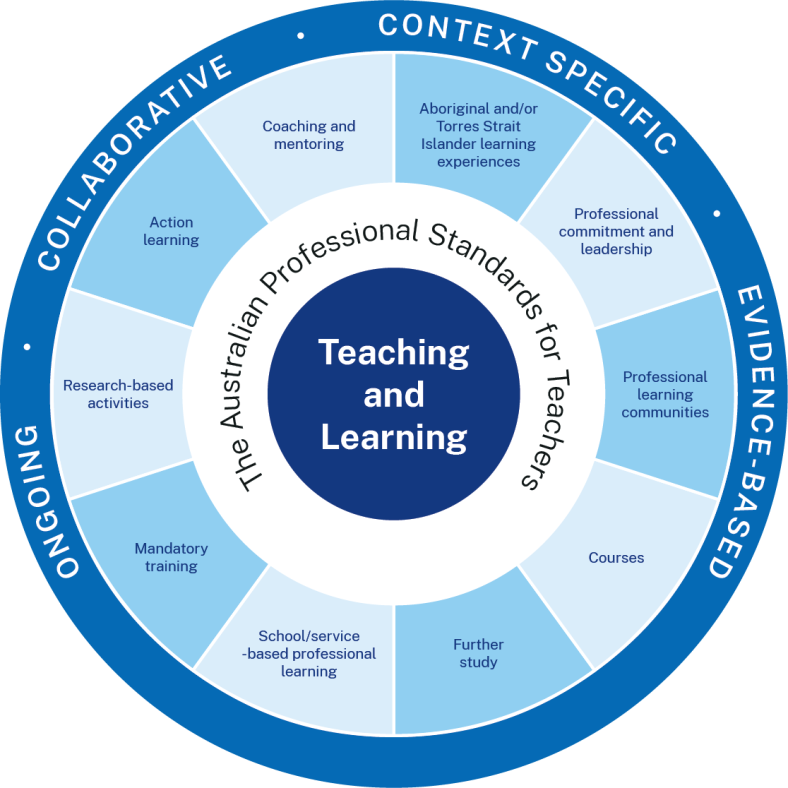NESA Professional Development Framework
The NESA Professional Development Framework (the Framework) helps teachers to identify effective PD activities.
The NESA Professional Development Framework (PDF 341.35KB) (the Framework) outlines features and examples of effective professional development (PD). It is designed to support teachers to identify and engage in effective PD activities that promote professional growth and lead to improved student/child outcomes. The Framework is not an additional requirement and can be used by teachers as a guide in selecting effective PD and to meet their maintenance of accreditation requirements.

Effective PD
PD is most effective when it is centred on teaching and learning and aligned to the Australian Professional Standards for Teachers. In addition, the Framework identifies 4 interrelated features that can guide teachers in selecting, implementing or reflecting on PD activities. Some PD activities may not include all features, but teachers can make these PD activities more effective by applying the learning into practice and collaboratively reflecting on it to inform future planning.
Ongoing
Effective PD is future focused and embedded in practice. It involves applying new learning or practices into teaching, evaluating them, and using these evaluations to inform next steps. In doing this, teachers build a broad repertoire of strategies to adapt to new situations.
Collaborative
PD is most effective when teachers actively work with colleagues using structured conversations about teaching practices, including feedback, evaluations and reflections. Expert teachers play an important role in leading collaborative discussions.
Context specific
PD is meaningful when it is relevant to teachers’ individual circumstances, identified student/child needs and aligned to school/service priorities. It may be based on student/child information and data. The information and data can be used to select PD activities or form the basis of evaluations, reflection and feedback on teaching practices.
Evidence-based
PD should promote evidence-based teaching practices and the theory that underpins them. Theoretical understanding of practices can support teachers to understand what works in different situations. It can also challenge current practice and support innovation, especially when coupled with critical reflection and collaborative discussions.
Priority areas
The following areas have been identified by NSW education stakeholders as priorities for teachers in schools and early childhood services. Teachers are encouraged to complete PD activities relating to these priority areas, but they are not mandatory.
- Delivery and assessment of NSW curriculum/EYLF
- Student/child mental health
- Students/children with disability
- Aboriginal education and supporting Aboriginal students/children
- Leadership to support the learning outcomes of students/children
Effective PD activities
This list of PD activities can be used by teachers to identify, engage in and log PD to meet their maintenance of accreditation requirements. The list is organised by the activity types represented in the Framework diagram. The list is not exhaustive, and teachers may engage in other forms of PD. Teachers are encouraged to engage in a variety of PD types but there are no minimum requirements.
| PD activity type | PD activity examples |
|---|---|
| Aboriginal and/or Torres Strait Islander learning experiences | On Country learning Cultural responsiveness and cultural safety training Collaborating with local Aboriginal Elders and/or community members on planning and programming Engaging with local Aboriginal Elders and/or community members in relation to cultural protocols Development of, and activities to support, whole school/service initiatives, such as a Reconciliation Action Plan |
| Action learning | Classroom/learning environment observations Learning walks Inquiry cycles Quality Teaching Rounds |
| Coaching and mentoring | Pre-service teacher supervision Early career teacher mentoring Coaching Collegial mentoring Instructional coaching cycle |
| Courses | Courses developed by sectors, employers, professional teacher associations, teacher unions and other PD providers NESA Learning (e.g., credentialing, disability provisions, training for HSC exam development and marking, training for NAPLAN, NSW Curriculum update training, Proficient Teacher and HALT orientation, HALT Applicant, Accreditation Supervisor orientation, Making consistent Proficient Teacher accreditation decisions) Conferences and lectures Courses in the priority areas Seminars and webinars |
| Further study | Micro-credentials Post graduate study in education or a field related to teaching area Further education with relevancy to teaching and learning VET training to enable delivery of VET courses to students |
| Mandatory training | Employer mandated courses or compliance training e.g., anaphylaxis, CPR, first aid, child protection, fraud and corruption, professional responsibilities |
| Professional commitment and leadership | Contributions to pilots, trials, projects or sector initiatives Research for delivery of PD Participation on advisory boards Professional writing |
| Professional learning communities | Collaborative learning activities Structured professional conversations focusing on improving practice Professional learning networks |
| Research-based activities | Action research Professional writing Professional reading of education-based journal articles, professional reports, research papers, books, academic podcasts or texts |
| School/service based professional development | Culturally relevant pedagogies Internal PD sessions and guest speakers PD in response to identified school/service priorities |
What activities are not PD?
Professional development is any activity where you learn new skills or practices that are related to the Standards. Roles and responsibilities that are part of your duties as a teacher are not counted as PD. For example, you cannot record:
- programming and planning
- administrative staff meetings
- event coordination and excursions
- writing student/child reports
- marking and moderating
- extra-curricular commitments or planning
- coaching or leadership of student/child initiatives
- creation of, or collaboration on, individual learning plans
- parent/carer-teacher interviews and meetings
- trade union training
- courses unrelated to teaching or curriculum.